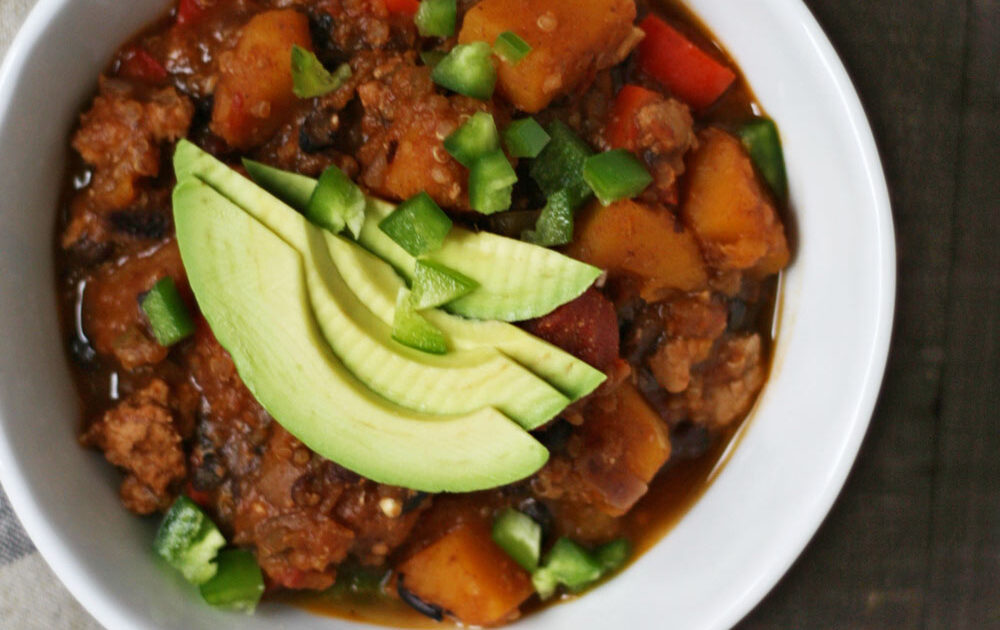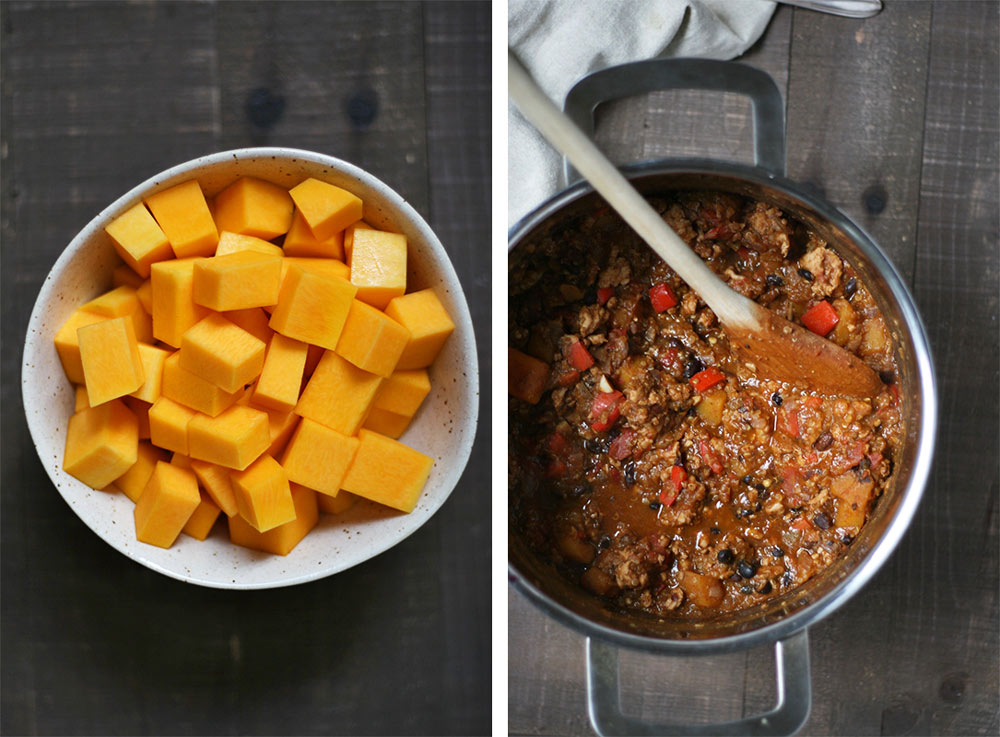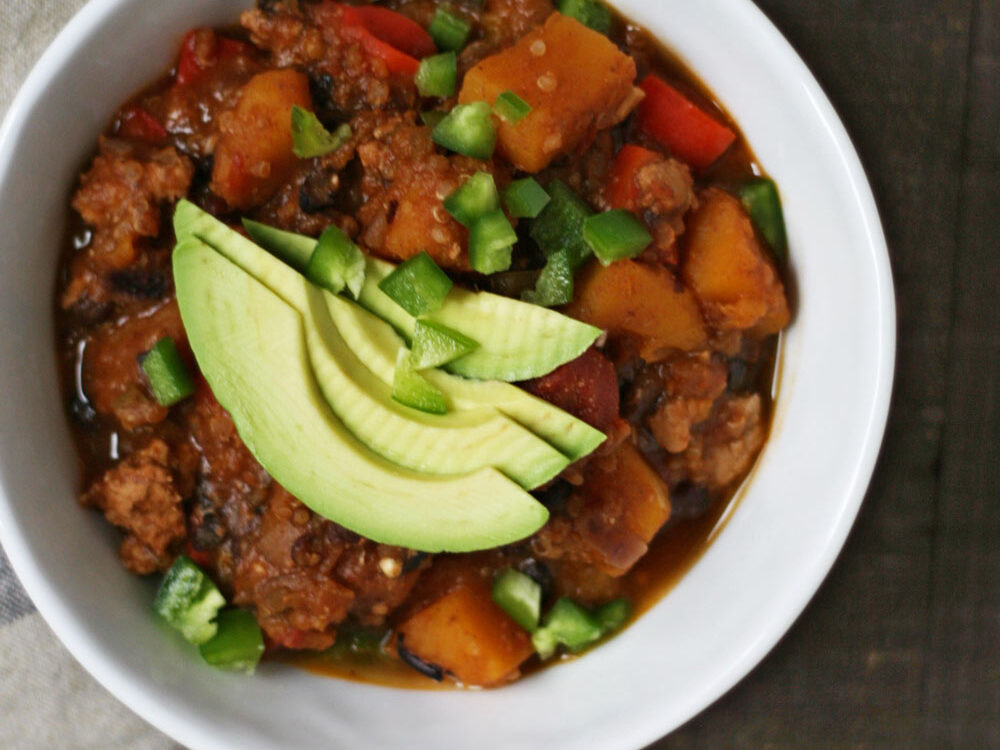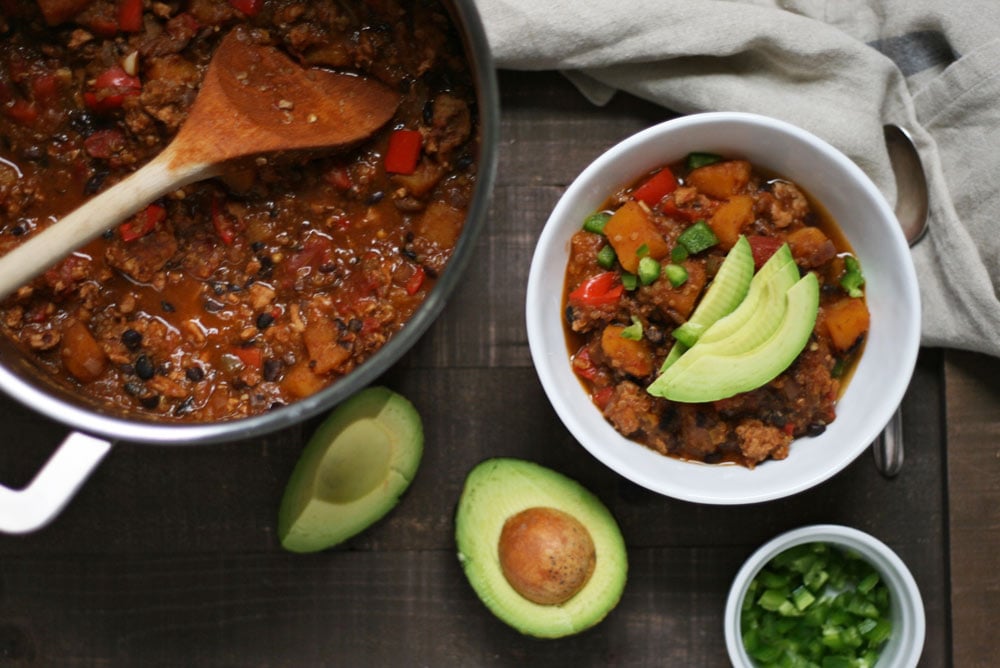Next Level Turkey Chili Recipe with Sweet Butternut Squash and Quinoa
This turkey chili recipe is easy to make and has a richly complex flavor profile that brings it to the next level. Creamy butternut squash and protein-packed quinoa give it a nutrition boost. Get the recipe now.

If you grew up on beefy, meaty chili topped with loads of cheese… well, you’re not alone. And there’s nothing wrong with those recipes! Our inherited recipe card is well-worn, spattered with grease, and it ain’t going anywhere. But for evenings when you want something just as warming but a little bit more wholesome and nourishing, it might be high time you took this version for a whirl.
There are no processed meats in this chili, no bacon bits or salty chips or processed “cheese.” Instead, this turkey chili recipe relies on organic ground turkey and seasonal butternut squash for a moreish meal you’re sure to love not only the moment you make it, but reheated for lunch the next day (if there’s any left over, that is!)
Trust us: when the weather is gloomy, cold, and rainy outside, this butternut squash and turkey chili recipe is where it’s at – whether you’re watching a football game, cozying up to a movie, or having a big day at your favorite sweater-weather activity.
Never miss a new recipe. Sign up for our newsletter for more sweets, sips, and eats ideas along with well-researched, non-toxic living guidance and smart wellness advice.
A Protein Powerhouse Chili Recipe Thanks to Turkey
Although often thought of as the centerpiece for Thanksgiving, turkey is a delicious and healthy meat that can be enjoyed in a variety of recipes year round. In fact, quality organic and pasture-raised turkey is a suitable swap for the traditional ground beef or pork in many recipes, such as spaghetti Bolognese, burgers, tacos, and, of course, chili and this leftover turkey soup.


When purchasing ground turkey, always chose the organic option. If possible, look for turkey that has been pasture-raised as well. A panoply of labels purporting to prove the welfare status of animals is widespread in this country, so do your research: To find the best, most humanely-raised bird, consider local farms or talk to your grocer to find out how the turkey was raised.
Research1 shows that pasture-raised meat, eggs, and dairy products are tastier and healthier than factory farm-raised alternatives. These meats are not only lower in calories and total fat, but pasture-raised foods2 also boast higher levels of vitamins and a healthier balance of omega-3 and omega-6 fats than conventional meat and dairy products.
Nutritionally speaking, turkey3 is low in calories and high in protein, and it packs a variety of micronutrients as well. Turkey is rich in B vitamins, including niacin, which helps to promote healthy blood circulation, metabolism, and aids in the maintenance of cholesterol levels. Turkey also contains vitamin B6, which supports nerve function, as well as selenium, which is necessary for proper nerve function.

Butternut Squash Adds Sweetness and Nutrients to this Turkey Chili
Adding butternut squash to chili is a total flavor and nutrient game changer. The squash not only provides a sweet and creamy flavor, but it amps up the vitamin and mineral content as well.
Butternut squash is a fiber-filled vegetable that promotes healthy digestion, and it keeps eyesight sharp, thanks to ample amounts of vitamin A. It also boosts immune function thanks to its high vitamin C content, though it must be said that much of the vitamin C is lost in the cooking process – as with any cooked produce4.
If you don’t have any butternut squash handy and want to make this asap, sweet potatoes are another promising option here. You’ll probably love this sweet potato lentil shepherd’s pie, too, if you’re in a cozy mood, or this veggie-packed pot pie.
Psst… If you make this turkey chili recipe, we’d love to hear about it in the comments!
Other superstar turkey chili recipe ingredients include quinoa for protein, omega-3 fatty acids, and toothsome texture, as well as spicy jalapeño to give your metabolism a kick5, and a variety of warming and flavorful spices, such as cinnamon and cayenne.
With such an impressive nutrient and flavor profile – and thanks in no small part that it takes less than an hour to cook and serves a crowd – this butternut squash and turkey chili recipe is sure to become a staple in your household.
How to Make This Turkey Chili Recipe with Butternut Squash

Ingredients
To Garnish
Preparation
Sources
1. https://rucore.libraries.rutgers.edu/rutgers-lib/45132/PDF/1/play/
2. http://www.sustainabletable.org/248/sustainable-livestock-husbandry
3. https://www.healthline.com/nutrition/turkey
4. http://well.blogs.nytimes.com/2013/10/18/ask-well-does-boiling-or-baking-vegetables-destroy-their-vitamins/?_r=0
5. https://www.healthline.com/nutrition/jalapeno-health-benefits

